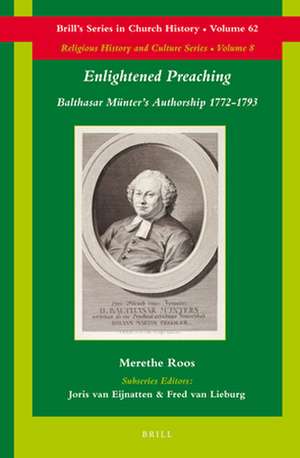Enlightened Preaching: Balthasar Münter’s Authorship 1772-1793: Brill's Series in Church History, cartea 62
Autor Merethe Roosen Limba Engleză Hardback – 7 mar 2013
Din seria Brill's Series in Church History
- 18%
 Preț: 657.68 lei
Preț: 657.68 lei - 18%
 Preț: 657.22 lei
Preț: 657.22 lei - 18%
 Preț: 667.32 lei
Preț: 667.32 lei - 18%
 Preț: 650.53 lei
Preț: 650.53 lei - 18%
 Preț: 656.96 lei
Preț: 656.96 lei - 18%
 Preț: 693.42 lei
Preț: 693.42 lei - 18%
 Preț: 694.82 lei
Preț: 694.82 lei - 18%
 Preț: 691.32 lei
Preț: 691.32 lei - 18%
 Preț: 692.79 lei
Preț: 692.79 lei - 18%
 Preț: 694.82 lei
Preț: 694.82 lei - 18%
 Preț: 692.40 lei
Preț: 692.40 lei - 18%
 Preț: 696.66 lei
Preț: 696.66 lei - 18%
 Preț: 697.94 lei
Preț: 697.94 lei - 18%
 Preț: 693.65 lei
Preț: 693.65 lei - 18%
 Preț: 1342.46 lei
Preț: 1342.46 lei - 18%
 Preț: 1350.49 lei
Preț: 1350.49 lei - 18%
 Preț: 695.28 lei
Preț: 695.28 lei - 18%
 Preț: 692.88 lei
Preț: 692.88 lei - 18%
 Preț: 683.75 lei
Preț: 683.75 lei - 18%
 Preț: 682.20 lei
Preț: 682.20 lei - 18%
 Preț: 893.08 lei
Preț: 893.08 lei - 18%
 Preț: 890.70 lei
Preț: 890.70 lei - 18%
 Preț: 889.26 lei
Preț: 889.26 lei - 18%
 Preț: 808.12 lei
Preț: 808.12 lei - 18%
 Preț: 820.98 lei
Preț: 820.98 lei - 18%
 Preț: 811.64 lei
Preț: 811.64 lei - 18%
 Preț: 665.93 lei
Preț: 665.93 lei - 18%
 Preț: 660.24 lei
Preț: 660.24 lei - 18%
 Preț: 663.43 lei
Preț: 663.43 lei - 18%
 Preț: 1065.31 lei
Preț: 1065.31 lei - 18%
 Preț: 663.99 lei
Preț: 663.99 lei - 18%
 Preț: 718.82 lei
Preț: 718.82 lei - 18%
 Preț: 1457.95 lei
Preț: 1457.95 lei - 18%
 Preț: 690.26 lei
Preț: 690.26 lei - 18%
 Preț: 689.88 lei
Preț: 689.88 lei - 18%
 Preț: 1254.34 lei
Preț: 1254.34 lei - 18%
 Preț: 662.70 lei
Preț: 662.70 lei - 18%
 Preț: 664.38 lei
Preț: 664.38 lei - 18%
 Preț: 690.92 lei
Preț: 690.92 lei - 18%
 Preț: 836.25 lei
Preț: 836.25 lei - 18%
 Preț: 858.34 lei
Preț: 858.34 lei - 18%
 Preț: 612.64 lei
Preț: 612.64 lei - 18%
 Preț: 867.45 lei
Preț: 867.45 lei - 18%
 Preț: 982.72 lei
Preț: 982.72 lei - 18%
 Preț: 759.68 lei
Preț: 759.68 lei - 18%
 Preț: 794.46 lei
Preț: 794.46 lei - 18%
 Preț: 548.33 lei
Preț: 548.33 lei - 18%
 Preț: 925.93 lei
Preț: 925.93 lei - 18%
 Preț: 636.54 lei
Preț: 636.54 lei
Preț: 662.04 lei
Preț vechi: 807.37 lei
-18% Nou
Puncte Express: 993
Preț estimativ în valută:
126.68€ • 132.62$ • 104.82£
126.68€ • 132.62$ • 104.82£
Carte indisponibilă temporar
Doresc să fiu notificat când acest titlu va fi disponibil:
Se trimite...
Preluare comenzi: 021 569.72.76
Specificații
ISBN-13: 9789004248830
ISBN-10: 9004248838
Pagini: 280
Dimensiuni: 155 x 235 x 23 mm
Greutate: 0.59 kg
Editura: Brill
Colecția Brill
Seria Brill's Series in Church History
ISBN-10: 9004248838
Pagini: 280
Dimensiuni: 155 x 235 x 23 mm
Greutate: 0.59 kg
Editura: Brill
Colecția Brill
Seria Brill's Series in Church History
Cuprins
Introduction
Why Balthasar Münter?
Textual sources and theoretical perspectives
1: Balthasar Münter – his life and work in Copenhagen
Who was Balthasar Münter?
Münter's writings
Saint-Petri Church
2: Münter during the Høegh-Guldberg Government, 1772-84. Texts and contexts
The context of church policy: Høegh-Guldberg's understanding of the Bible as a normative text
The theological context
The context of eighteenth century church service
Sermon ideals in Denmark-Norway
Balthasar Münter's texts.
Geistliche Lieder 1772-74.
Predigten über die gewöhnliche Sonntagsevangelien, 1778-84
Anleitung zur Erkenntnis und Ausübung des christlichen Glaubens
3: Analysis: Balthasar Münter and contemporary theological and cultural movements, 1772-84
Münter's goal: Devotion
Münter's neological inheritance
The legacy of Copenhagen's circle of poets: the function of hymns in the church service
Münter versus Bastholm: The sermon as rhetoric
Summary: Balthasar Münter's preaching from 1772-84
4: Münter during the Bernstorff government, 1785-93: Texts and contexts
The political and societal frame: A new government - a new society
The frame of church policy: Changes in the relationship between the state and the church
The social context: German elite culture in Copenhagen – the salons of the German aristocracy and their esoteric interests
Balthasar Münter's texts
Oeffentliche Vorträge, 1785-93
5: Analysis: Balthasar Münter and contemporary theological and cultural movements, 1785-93
Comparative perspectives on Münter's development: 1772-84 and 1785-93
Münter during the Bernstorff era: Four aspects of theology, social life and literature
6: Enlightened preaching - Balthasar Münter 1772-93
Münter's intention in writing
Contributing to the Enlightenment
Bibliography
Appendix 1: Pericopes in Predigten über die gewöhnlichen Sonntagsevangelien in Verbindung mit anderen Schriften
Appendix 2: Pericopes in Oeffentliche Vorträge über die Reden und Begebenheiten Jesu
Index
Introduction
Why Balthasar Münter?
The German theologian and pastor Balthasar Münter (1735-93) is known primarily for being the spiritual advisor of Johann Friedrich Struensee (1735-72) at the time when Struensee was sentenced to death for his illegitimate leadership of Denmark-Norway in 1772. Struensee came to power in 1770 and rapidly introduced radical reforms and liberal attitudes that were
Notă biografică
Merethe Roos, Ph.D. (2010) in Theology, MF Norwegian School of Theology, is Associate Professor and Head of research and master studies at Østfold University College, Norway.
Recenzii
„Die Arbeit leistet einen methodisch immer noch innovativen Zugang zur Interpretation aufgeklärter Predigt.“ Markus Wriedt, Frankfurt (Main), in: Theologische Literaturzeitung, Volume 143.9 (2018).
